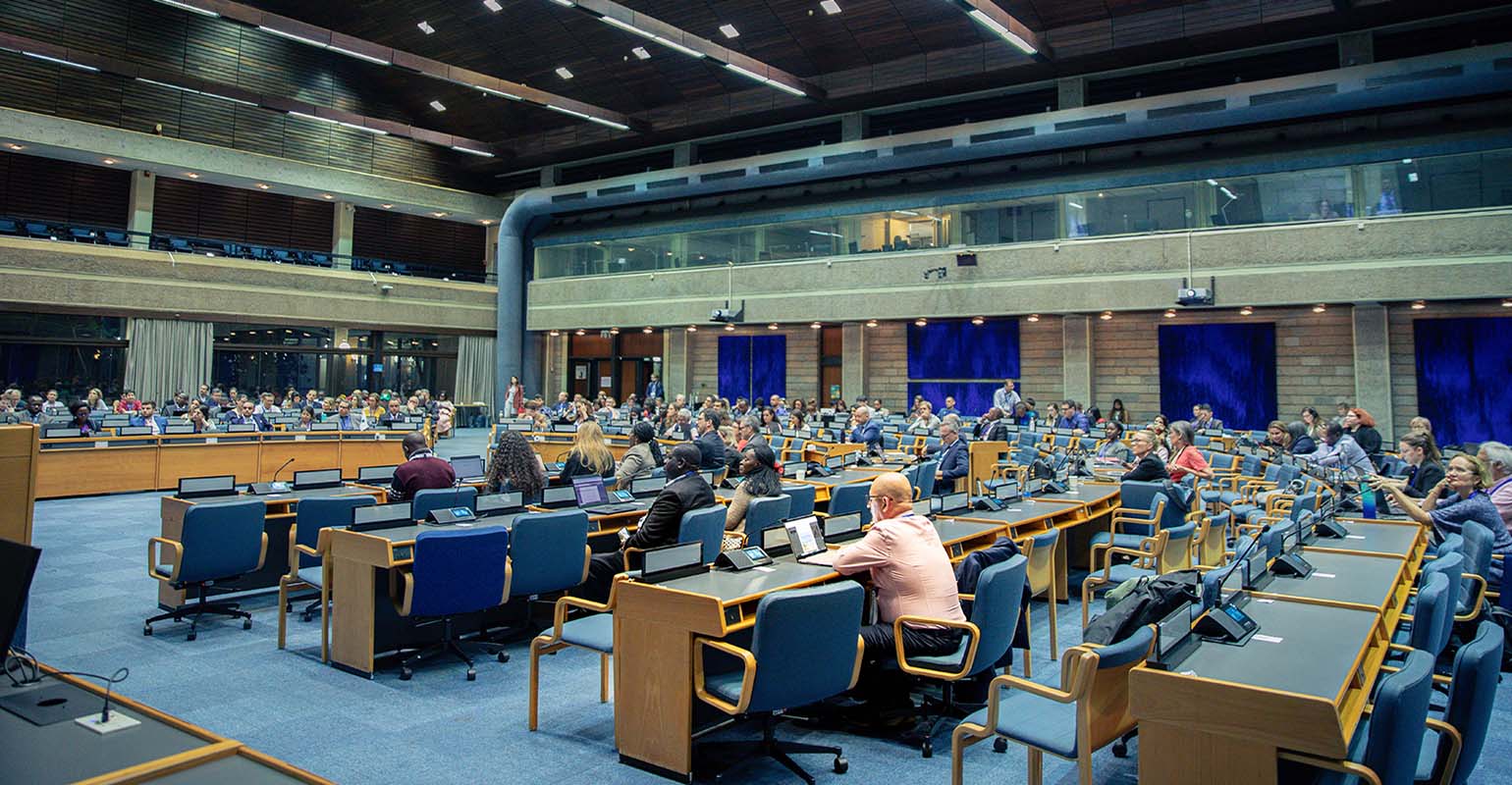
Plastics Treaty Contact Groups Tackle Myriad, Complex Issues

Progress toward the U.N.’s global plastics treaty was detailed today, Nov. 16, during a stock-taking plenary session at the third Intergovernmental Negotiating Committee (INC-3) in Nairobi. Some members reiterated earlier calls to name 2040 as the date to end plastic pollution.
The sheer array of topics discussed thus far — ranging from definitions of key plastics terms to global monitoring of progress toward achieving the objectives of the final instrument — illustrated the intensity, complexity, and magnitude of the task. INC Chair Gustavo Meza-Cuadra noted that more than 300 delegate submissions have been received so far.
“I am confident that we are on the right track as we advance the development of the instrument,” he asserted.
Three contact groups are refining the “zero draft” document (UNEP/PP/INC.3/4) issued after INC-2, collecting input from delegates of member states as well as observers of the negotiations.
Contact group 1: Reviewing parts 1 and 2. The group’s co-facilitators are from Palau and Germany. The group has held four meetings and received 182 submissions from members concerning topics including:
- Primary plastic polymers and chemicals and polymers of concern;
- “problematic” and avoidable plastics (including short-lived, single-use, and microplastics);
- product design, composition, and performance;
- non-plastic substitutes, extended producer responsibility (EPR), emissions.
Topics members raised as warranting intersessional work included:
- Targets for managing and/or reducing global production and supply of primary plastic polymers, including baselines of polymers, levels of sustainable consumption, and effects on GDP;
- exemptions, minimum sustainable design and performance criteria and standards, including circularity;
- assessment of health and environmental impacts of micro and nano plastics;
- sources and pathways of emissions and releases;
- methodologies for monitoring existing plastic pollution;
- lifecycle management of EPR;
- assessment of financial needs to meet the provisions contained in the future treaty;
- definitions of key plastics terms and even terms like “just transition” and “producer.”
Contact group 2: Reviewing parts 3 and 4. Co-facilitators are from Australia and Ghana. The group has held three meetings covering issues including:
- Financing;
- capacity building;
- technical assistance and technology transfer;
- national plans;
- implementation and compliance;
- reporting on progress;
- periodic assessment and monitoring the progress of implementation of the instrument;
- international cooperation and information exchange.
Financing topics that members raised as warranting intersessional work included recommendations for:
- An overview of types of activities that may need to be supported financially to effectively implement the instrument being developed;
- analysis and potential mapping of existing financial flows that support or could support such activities — this could occur across the plastics lifecycle and across geographies, potentially at the national and regional levels;
- analysis of different options for a financial mechanism;
- developing further information on innovative financing.
Contact group 3: Reviewing synthesis report (document UNEP/PP/INC.3/INF/1) of submissions received on elements not discussed at INC-2. Those submissions addressed parts 1, 5, and 6 of the zero draft: The preamble, definitions, principles, and scope; institutional arrangements (governing and subsidiary bodies and secretariat); and final provisions (including settlement of disputes and amendments to the instrument). Co-facilitators are from France and Indonesia. The group has held three meetings; among the developments reported:
- Preamble: Discussions centered on producing a streamlined introduction that spells out the history and context of the instrument and sets its tone in a concise manner. Some members think this section should name 2040 specifically as the date to end plastics pollution — a sentiment expressed previously by the 58-member High Ambition Coalition led by Norway and Rwanda. (Read UNDP blog post, “A step toward ending plastic pollution by 2040.”)
- Governing body: Members broadly agreed on establishing a conference of parties (COP).
- Subsidiary bodies: Should include a scientific and technical body; compliance and implementation committee (although some expressed views that compliance matters should be left to national jurisdiction); a clearinghouse mechanism for information exchange; and a financial mechanism to consider issues like funding for developing countries.
- Final provisions: Members expressed that this language could be based either on existing Multilaterial Environmental Agreements (MEAs) or the document INC-1/8.
Contact groups will continue working through Saturday. Plenary sessions to summarize the results of this week’s negotiations will be held Saturday and Sunday.
The primary divide in the negotiations has been whether to manage plastics pollution from the “bottom up” — making nations responsible for environmental cleanup and costs — or mandate a stricter approach that clearly limits or bans production of “problematic” and hard-to-recycle plastics.
The United Nations Environment Program (UNEP) resolved in March 2022 to develop a legally binding instrument regulating plastic pollution worldwide, with negotiations being completed by the end of 2024. INC-3 follows negotiating sessions INC-1 in Uruguay from Nov. 28 to Dec. 2, 2022, and INC-2 in Paris from May 29 to June 2, 2023. INC-4 is scheduled for April 21 to 30, 2024, in Ottawa.
The full INC-3 meeting schedule is available online.
Watch INC-3 sessions, as well as sessions from INC-1 and INC-2.
The zero draft text and other INC-3 working documents can be found on the UNEP website.
Read a Q&A with Jyoti Mathur-Filipp from UNEP.

Leave a Reply